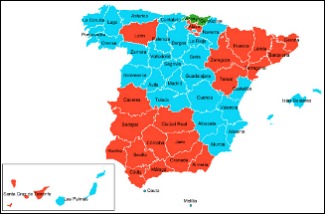The Impact of the 2004 Election on Spanish Companies

As it is well known, in the last days of the electoral campaign for the 2004 general election in Spain, on Thursday March 11th 2004, a series of simultaneous terror attacks caused the death of 191 persons in commuting trains in the capital Madrid. Four days later, the opposition party PSOE won the election, against all predictions that were made prior to the terror attacks.
This change in expectations presents a unique opportunity to take advantage of event study techniques (which measure the impact of surprise events on the stock market) to test some politico-economic hypotheses. The academic jounal SERIEs has accepted a paper by Pau Castells (now at the UK Government Economic Service and PhD candidate at the Autonomous University of Barcelona) and Francesc Trillas (Postgraduate programmes coordinator of the Department of Applied Economics) on the impact of the March 2004 general election on large Spanish firms.
One of the problems of many event studies is that long event windows run the risk of including effects of events other than those under analysis; the fact that in this case the election result could not have been predicted four days before the election greatly reduces the meaningful length of the event window and hence the potential for event contamination, except for the potential confusion between the attacks themselves and political change.
But we isolate the effect of the attacks themselves by looking at the effects on the stock prices of specific economic sectors (such as tourism) on the day of the attacks and the day after, that were more affected by the attacks than by the elections. We use data for 87 firms in Madrid’s continuous market. We use daily returns data from Infomercados, a financial web site specialized in Spanish equity markets.
One of the hypotheses that we test is that political parties tend to converge in the centre of the ideological spectrum (Median Voter Theorem), implying that there are no differences in practice in policy terms. The other is that politicians and managers collude, for example through the presence of former politicians in the Board of Directors of firms. Convergence theories prove quite resilient in our study as, jointly, on average quoted firms were not significantly affected by the election outcome. We find that, in spite of rhetoric, investors did not expect significant differences between both major Spanish political parties. The expectation was that the degree of convergence in policies affecting the average profits of firms in the overall market would be high.
The overall results are consistent with no partisanship (so no effect on expected macro policies such as fiscal policy, inflation, public expenditure or unemployment policies that may affect the market as a whole). Parties may indeed diverge in non-economic policy dimensions, such as social, religious and cultural norms, foreign policy, or the degree of institutional decentralization. But the profit expectations of the stock market as a whole remained unaffected.
The results on the impact on politically connected companies and particular economic sectors, however, suggest that particular industries and businesses may be affected by the political structure of Spain and the nature of its business-politicians networks. A number of companies were indeed affected by the election results analysed in this article, and the empirical results provide some support to the hypothesis that the degree of political connectedness of such businesses is at the core of explaining the impact of the surprise election results on their financial returns.
Of the 87 firms analyzed, 46 were politically connected, in the sense of having some former politician or a person clearly linked to a political party in the Board of Directors. We find only weak evidence that politically connected firms on average were affected by the surprise results. But firms that were connected to the Popular Party were significantly affected by the result. Interestingly, the impact could be positive or negative. It was negative in the case of Endesa but it was positive for example in the case of Telefónica or Iberia.
Firms in the energy sector could be affected by partisan effects beyond those related to political connections, because the sector was in the middle of a merger wave about which political parties held different opinions. The fact that firms linked to the PP could have a positive effect from the Socialist Party victory can be interpreted as the collusion between managers and PP politicians being damaging for shareholders.
Our interpretation of these results is that the impact of one party or another governing in Spain is not that there will be big changes in general economic policies, but that the value of collusive agreements between politicians and firms changes.
References
"The effects of surprise political events on quoted firms: the March 2004 election in Spain". Pau Castells; Francesc Trillas. SERIEs: Journal of the Spanish Economic Association. Accepted: 7 October 2011. DOI 10.1007/s13209-011-0080-5.

